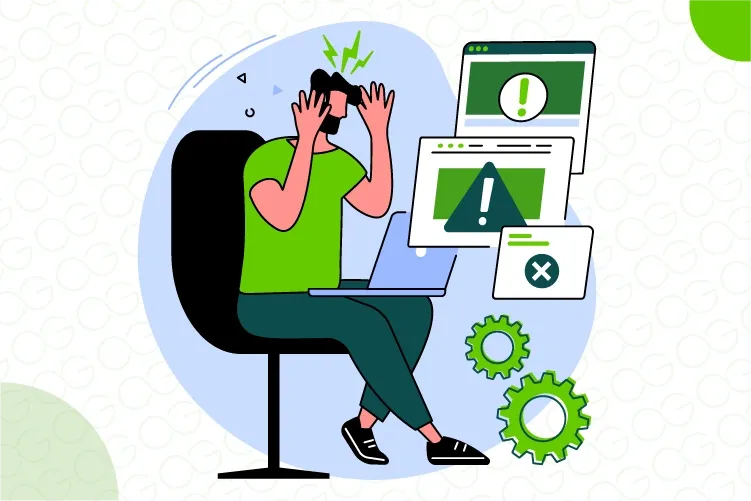What Causes Retail ERP Implementations to Fail and How to Prevent It
An Enterprise Resource Planning (ERP) system is a suite of integrated software tools that enables businesses to manage, monitor, and automate their core operations. In the retail sector, where functions span from procurement to inventory management, merchandising, point-of-sale (POS) transactions, finance, human resources, and customer relationship management (CRM), ERP solutions offer a centralized system to streamline workflows and enhance efficiency.
While ERP systems have the potential to transform retail operations and drive significant growth, successful implementation is not guaranteed. Even after investing in a high-quality ERP system or building a custom in-house solution, retailers may encounter critical pitfalls that can cause the implementation to fail.
This blog explores key reasons why ERP implementations fail in the retail industry and outlines strategies to ensure successful deployment.
1. Lack of a Comprehensive Implementation Plan
One of the leading causes of ERP implementation failure is inadequate planning. Retailers often rush into implementing ERP systems as a quick fix for outdated management tools or disjointed operations. However, implementing an ERP system is not merely an IT upgrade—it is a strategic shift that impacts every department in the organization.
Retailers need to set clear objectives for the ERP implementation, backed by a defined scope and timeline. This includes:
- Mapping existing business processes
- Defining the expected outcomes
- Allocating a realistic budget
- Assigning dedicated internal resources
- Involving stakeholders from all departments
A successful plan should also anticipate risks, identify contingency measures, and include a detailed roadmap for training and change management.
2. Choosing the Wrong ERP Product
Not all ERP systems are created equal. One of the most critical steps in the ERP journey is selecting a solution that aligns with your business needs. A mismatch between the ERP system’s capabilities and the business requirements can lead to underutilization, workflow disruptions, and financial losses.
For example, a multi-store fashion retailer needs modules for:
- Centralized inventory management
- Inter-store transfers
- POS systems for each outlet
- CRM and loyalty programs
- Omnichannel integrations
Choosing an ERP designed for small businesses or single-store management will not meet the demands of such a complex operation. Hence, businesses must conduct a thorough assessment of available ERP vendors, evaluate feature compatibility, and opt for a solution that supports scalability.

Avoid costly ERP pitfalls with Ginesys Retail ERP – built for seamless implementation and retail success.
3. Lack of Management Buy-In and Leadership Involvement
ERP implementation requires a cultural shift and cannot be managed solely by the IT department. A lack of commitment from senior management often leads to half-hearted adoption and resistance to change from employees.
Successful ERP projects are typically driven by leadership who actively champion the initiative, communicate its importance, and motivate teams to embrace the transition. A clear demonstration of support from the top encourages accountability and ensures organization-wide alignment.
Management should:
- Allocate the necessary resources
- Encourage cross-functional collaboration
- Monitor implementation milestones
- Be open to feedback and adaptation
4. Poor Change Management and Employee Training
Resistance to change is natural, especially when employees are accustomed to legacy systems. An ERP system, no matter how advanced, will not deliver value unless users are comfortable using it.
Insufficient training can result in operational errors, poor data quality, and underutilized features. Retailers must invest in comprehensive training programs tailored to different user roles within the organization.
Additionally, change management strategies such as:
- Creating change ambassadors within departments
- Regular internal communication
- Conducting hands-on sessions and pilot testing

5. Underestimating Data Migration Challenges
Migrating data from old systems to a new ERP is one of the most technically demanding aspects of implementation. Incomplete, inaccurate, or redundant data can disrupt operations and affect decision-making.
Retailers should perform thorough data audits before migration, cleanse historical records, and establish data standards to ensure consistency. Adequate planning for data mapping, validation, and backup is essential.
6. Ignoring Integration with Existing Systems
Retail businesses often operate using multiple tools—for eCommerce, warehouse management, supply chain logistics, and customer support. If the ERP system cannot integrate seamlessly with these existing platforms, it will lead to fragmented workflows and duplicated effort.
Choosing an ERP with open APIs and pre-built connectors helps streamline integration and enables real-time data exchange across platforms. This ensures continuity in operations and minimizes disruptions.
7. Customization Overload
While ERP customization may seem like a good idea to meet unique business needs, excessive modifications can complicate the system, increase implementation time, and make future upgrades difficult.
Retailers should adopt industry best practices built into the ERP system, and only customize where absolutely necessary. A modular, configurable ERP system allows for flexibility without compromising on stability or scalability.
8. Failure to Monitor KPIs Post-Implementation
Many businesses treat ERP implementation as a one-time project and fail to track performance after go-live. Without monitoring KPIs, it becomes difficult to evaluate whether the ERP is delivering the intended value.
Retailers must track:
- Inventory turnover ratio
- Order accuracy rate
- Sales conversion rates
- POS performance
Supplier lead times - Customer satisfaction scores
This ongoing evaluation helps in refining processes and continuously improving ROI from the ERP system.

Additional Considerations for a Successful ERP Implementation
9. Scalability and Cloud Readiness
Retail businesses are rapidly evolving and expanding into new geographies and online channels. An ERP system must be scalable to support this growth. Cloud-based ERP systems offer flexibility, remote accessibility, and lower upfront costs compared to on-premise solutions.
10. Vendor Support and Updates
ERP implementation is not just about the initial deployment. Continuous vendor support, timely updates, and access to a knowledgeable helpdesk are vital for long-term success.
Retailers should evaluate vendors on their:
- Customer support responsiveness
- System upgrade frequency
- Community forums and user training resources
11. Omnichannel Capabilities
With the rise of eCommerce and hybrid shopping experiences, retailers must ensure their ERP system supports omnichannel operations. This includes:
- Unified inventory visibility across channels
- Integrated returns and exchanges
- Real-time promotions and pricing consistency
Ginesys: Your Trusted Retail ERP Partner
Ginesys is one of India’s leading ERP solution providers tailored specifically for the retail sector. Its cloud-first ERP suite helps brands and retailers manage operations across POS, inventory, supply chain, finance, and omnichannel integrations. With over 1200 customers across formats like exclusive brand outlets (EBOs), department stores, distributors, franchises, and omnichannel businesses, Ginesys has a proven track record of successful ERP deployments.
Key benefits of choosing Ginesys include:
- Scalable, modular architecture that supports business growth
- Real-time inventory and order tracking
- Seamless integrations with eCommerce marketplaces and web-store
- Centralized control for multi-store and multi-location operations
- Strong customer support and continuous product innovations
By partnering with Ginesys, retailers can avoid common pitfalls in ERP implementation and realize faster time-to-value. Ginesys provides not just software, but a holistic framework to future-proof retail businesses.
CTA: Concerned about ERP implementation risks? Let Ginesys experts guide you to a smoother rollout.
Talk to us – https://www.ginesys.in/contact-us
<H2>Transforming Retail with ERP
ERP systems have the potential to revolutionize retail operations, improve decision-making, and enhance customer satisfaction. However, their success hinges on strategic planning, stakeholder involvement, and a user-centric approach.
Understanding the common reasons for failure can help retailers navigate challenges and make informed decisions. By selecting the right ERP partner, investing in change management, and aligning implementation with long-term business goals, retailers can ensure their ERP deployment is not just successful but transformative.
A well-implemented ERP system does not just manage resources—it empowers retail businesses to thrive in a competitive, digital-first world. Book your demo with Ginesys today and take the first step toward retail success.

Concerned about ERP implementation risks? Let Ginesys experts guide you to a smoother rollout.
Transforming Retail with ERP
ERP systems have the potential to revolutionize retail operations, improve decision-making, and enhance customer satisfaction. However, their success hinges on strategic planning, stakeholder involvement, and a user-centric approach.
Understanding the common reasons for failure can help retailers navigate challenges and make informed decisions. By selecting the right ERP partner, investing in change management, and aligning implementation with long-term business goals, retailers can ensure their ERP deployment is not just successful but transformative.
A well-implemented ERP system does not just manage resources—it empowers retail businesses to thrive in a competitive, digital-first world. Book your demo with Ginesys today and take the first step toward retail success.

